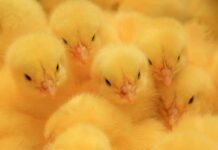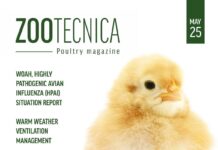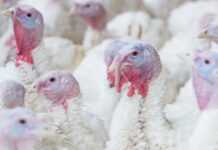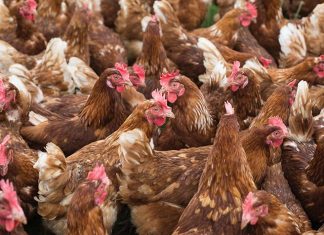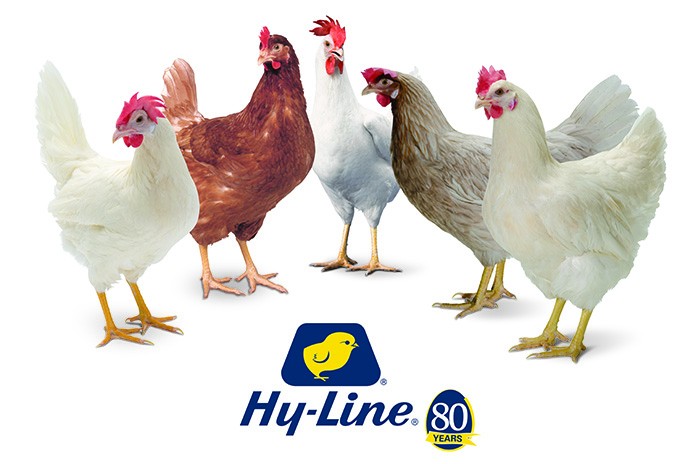
Hy-Line International is the world’s oldest and largest poultry genetics company and was the first poultry breeding company to apply the principles of hybridisation to commercial layer breeding.
This year marks Hy-Line’s 80th anniversary and the company, with its own in-house molecular genetics team, continues leading the industry in application of DNA-based technology to its breeding and genetics programme.
At EuroTier 2016, Zootecnica International had the opportunity to hold a round of high-level interviews.
The first in the series of interviews was with Brittney Roorda, International Marketing Manager Hy-Line International, who gave us her impressions about the exhibition in Hanover and how Hy-Line had faced up to the recent AI crisis in the USA.
“We are seeing good traffic at our booth. Many costumers have been stopping by, both current and potential ones, to join us in celebrating Hy-Line’s 80th anniversary. We are proud and very delighted with our activities and products. Our market share is growing all over the world and particularly in South East Asia. The interest in our layers, in their performance and our presence around the world confirms Hy-Line’s position as the best choice of breed. Here at this show we are seeing a concentration of people from Europe, from the Middle East and from Africa. We are very pleased with the response that we have had from our customers in these regions”.
When the industry in United States was faced last year with the AI crisis – Hy-Line played a major role in protecting its flocks. How did you do this?
“Highly pathogenic influenza is a reality in our world and we, as a breeder company, have to be able to overcome it. Thankfully, during the latest AI outbreak in the United States in 2015, no Hy-Line facilities were affected. Maybe we were a little bit lucky but it is also the result of all the biosecurity measures that we take in our production and research facilities. We have in place very strict guidelines so that our farm workers know perfectly well what to do and what they should avoid doing, before entering a farm.
Our biosecurity measures extend not only to the farms in Iowa but also to our global supply chain. We have several distribution hubs around the world. Should an export market close in one of those countries, we can look to send our genetics from another Hy-Line global hub. This is the reason why we were able to continue our supply throughout the bird flu outbreak in USA”.
Interview with Jesus Arango, Statistical Geneticist at Hy-Line International
Hy-Line’s genetics are well acclaimed. Can you describe your key features and strategies?
“Hy-Line International is the world’s oldest and largest producer of genetics for superior brown and white egg laying chickens. Our company is committed to an on-going research program that is designed to maximize profit potential from each flock and to assure even greater returns in the future.
This year our company while celebrating our 80th year anniversary also embraced the challenges of an innovative future. Our breeding programme at the current time is focusing mainly on getting longer single cycles of egg production in our layers. At Hy-Line, through a comprehensive selection program utilizing the latest in new technology we are selecting birds with high productivity, greater disease resistance, exceptional egg quality and outstanding liveability.
Our main effort is to maintain a good egg quality with special emphasis on the persistence of good shell quality, which is the ultimate trait of importance to ensure that laid eggs are sell-able ones. To accomplish it, we have been doing a series of important changes in our breeding programme. The first one consists of reinforcing our infrastructures in terms of our growing farms, layer farms and hatcheries in our pedigree systems in a way to ensure that our pure lines remain in production for a longer period of time.
Currently we are able to select layers with a production cycle of over 90 weeks. Moreover, we are strengthening our field tests programme, while introducing more and more tools of genomic selection”.
And what about the future?
“In the last year we have focussed on incorporating new pure lines into the genomic selection programme. Right now all our commercial lines, both brown and white egg breeding stock, include pure lines selected by genomic selection and we will also be reinforcing this processing in the near future”.
Could you briefly describe the new Hy-line variety – the W-80?
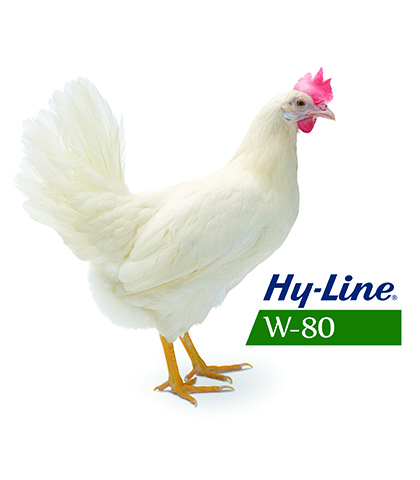 “In the context of our 80th Anniversary celebration, we launched the W-80, a robust white egg layer suitable for all housing systems and environments.
“In the context of our 80th Anniversary celebration, we launched the W-80, a robust white egg layer suitable for all housing systems and environments.
This bird delivers prolific egg numbers, excellent eggshell strength, and strong performance under challenging environments utilising low-density rations.
It is adaptable to alternative production systems and remains calm for easy management. For markets requiring a larger egg size, the W-80 Plus gives producers the same great Hy-Line traits with an egg weight profile up to two grams heavier”.
Interview with Kurt Rossi, Hy–Line International Sales Director
Could you briefly describe the situation in the CIS countries regarding the layer sector and what is now Hy-Line’s position and market share in this wide area?
“Our products are available in the CIS countries and currently we supply Hy-Line Brown layers in Russia and W-36 layers in Ukraine. In Azerbaijan, we successfully supply the Hy-Line Sonia/Gray that produces over 345 uniform, tinted eggs in a 80 weeks cycle, peaks in the mid-90’s and lays an ideal intermediate size egg. In general the tendency in Russia and Ukraine and in all of the CIS countries is the same as it is in the worldwide i.e. a demand for one-cycle birds without moulting. All the breeding companies want to be able to supply a super efficient bird that stays in production for 100 to 110 weeks.
Our pure line birds are currently running on a 90-week program. Over the past few years Hy-Line made investments in this direction and we are now running for the fourth generation. All the data over these 90 week cycles have been collated so that we will be able to replicate traits in a better way at commercial level for all lines, both brown and our two white lines”.
And what about the new Hy-Line W-80?
“We are planning to introduce this new robust, prolific and long single-cycle laying bird firstly in Russia and then in the Ukraine in the near future. The field of feed formulation is becoming more and more challenging as all customers strive to feed their birds in the most cost effective way. But sometimes cost effectiveness does not mean efficiency. So we are focussed on introducing the W-80 into the Russian and the rest of CIS markets because of its persistently long, single-cycle lay means more eggs on five grams less feed. Producers gain more profitability with feed savings of approximately two kilograms per bird per year versus competing strains”.
What are the other features that make your products differ from your competitors’ ones?
“I think that feed efficiency, eggshell quality and uniform egg size are the distinctive traits of our products. Egg shell quality is very important especially in Russia where there are long distances to cover. We also take care of our customers at commercial level and less cracks on delivery mean better results over the whole supply chain. We are happy with our performance because in Russia we are recording a growth of 16% over the last 2 years and in my opinion this is due to our efficient birds and the uniformity of their eggs. In the supermarket consumers want to find not only pretty packaging but most of all, nicely coloured and good quality eggs”.
What do you expect in the near future for the layer market in the CIS countries?
“All this area, and especially the Russian Federation, represents a very stable market. It is constantly growing even if in a minimal way. The Hy-Line strategy is directed to reinforce the local technical support so that our customers can always get the best results. In the CIS countries we are consolidating our market share and actually our flagship product, W-36, is the preferred bird of big integrators. As a breeder company we are responsible for quite a big percentage of the cost saving that our customers, the distributors, can offer to the consumer”.
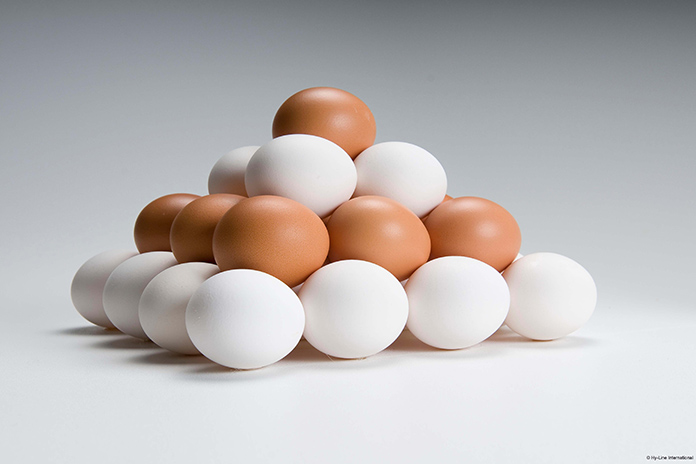
Interview with Jonathan Cade, President of Hy-Line International
Can you tell us something about your background and your experience at Hy-Line?
“I am from the UK and studied at the Harper Adams Agricultural University, specializing in poultry. I started working in the animal feed business, then for Sun Valley (Cargill), and then joined Cobb UK, where I was Director of Sales and Technical Services in the EMEA Region. Moving to Hy-Line was a new experience for me. Not only was I moving from the broader sector of heavy breeders into the sector of lighter breeders, I was also running the export business from the UK, which is Hy-Line’s second largest hub for parent stock exports. Then, our owners from the EW Group GmbH asked me if I would like to move to Des Moines, Iowa, USA to undertake the role of President of Hy-Line International. After some consideration, my family and I moved to the USA where now all of us my wife, son and daughter are very happy to live. This year Hy-Line celebrated its 80-year anniversary. To mark this important historical achievement, we launched our new white variety, a white egg layer named the W-80 so named in honour of our 80-year anniversary. This also happened when the company was founded in 1936, when the W-36 was so named.”
What are the reasons that motivated the company to launch this new product?
“We felt we needed another white variety to complement the W-36, one of our flagship products. The W-36, has very strong characteristics and is in much demand today. It is the most feed-efficient white variety table-egg bird in the world, thanks to its low mortality and its ability to produce cheap eggs due to a low feed intake. Low feed intake in some parts of the world can actually be considered a hindrance and a limiting factor. Accepting this, we needed to have a product, which consumed a little bit more feed. The W-80 bird does this, consuming slightly more feed than the W-36, which is a suitable scenario where humid or hot conditions exist. For the large-scale intensive egg producer, the W-36 is still the number one performing bird. Having two very different white varieties allows us to offer a white bird for every market in the world today.”
What are your current strategies and future goals?
“Investing is our basic focus. Three years ago we built a new pedigree farm. As with all breeding companies, our customers are requesting longer production cycles. We now need to offer hens capable of being competitive and able to produce satisfactorily beyond 80 weeks towards 90 or even 100 weeks in a continuous production cycle. By increasing the genetic populations on our farms, we can keep our pure lines and our pedigree birds to a later age, thereby allowing us more selection flexibility.
We are constantly investing in our infrastructure, and we spend more than 17% of our turnover in research and development. As we have more than 40% of the world market, we have to make sure our lines are the best and the healthiest available. Even during the severe Avian Influenza devastation that occurred in the state of Iowa 18 months ago, Hy-line International was able to maintain its own level of security and keep the bird flu out at a time when the whole market there sustained considerable losses.
As for poultry production in the future, we are looking for all our strains to lay more high-quality eggs with good solid shells and optimal internal quality. We will continue to give high priority to bird welfare and well-being in our stewardship of our livestock. The genetics involved in the production of good layers needs to be complimented with a team of experts. Hy-line is a global leader but we strive also to be a local player -‘known to be global, but thinking as a local’. Thinking as a local means employing local people speaking the language and understanding the culture, so we may interact with our distributors and our customers to provide fast technical support.
Hy-Line will back that local service up with experts in the fields of nutrition and veterinarian sciences. This support, be it physical, such as farm visits, or simply by the provision of technical updates and literature on relevant topics, is welcomed by our local teams and our customers. We will continue updating our bird management techniques while keeping our focus on the farmer”.


